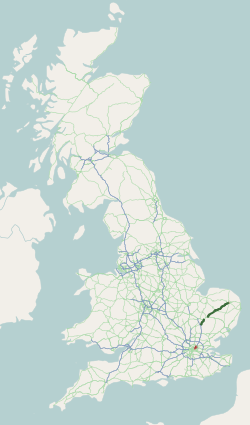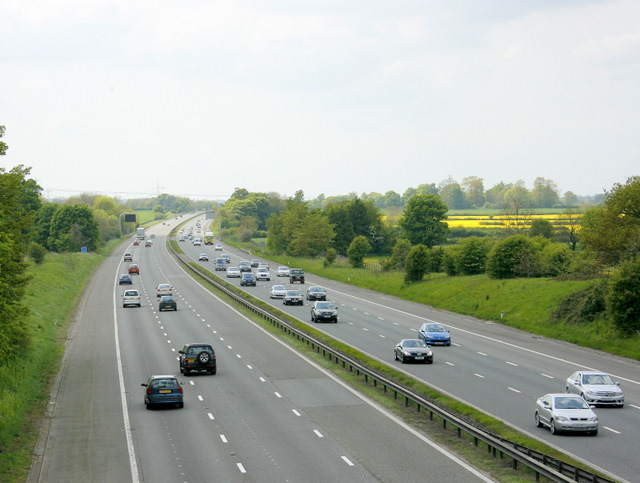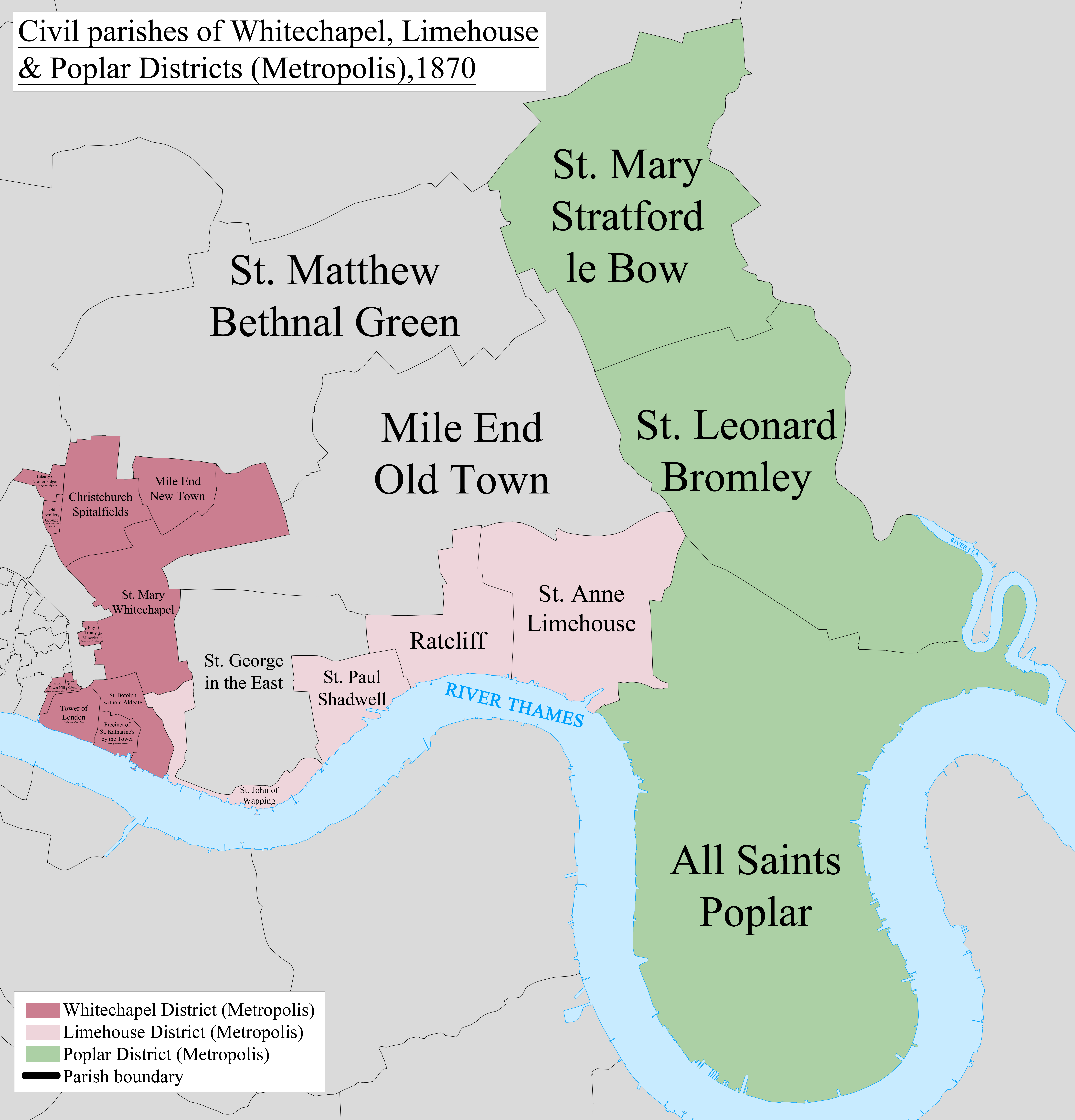|
A11 Road (England)
The A11 is a major trunk road in England. It runs roughly north east from London to Norwich, Norfolk, although after the M11 opened in the 1970s and then the A12 extension in 1999, a lengthy section has been downgraded between the suburbs of east London and the north-west corner of the county of Essex. It also multiplexes/overlaps with the A14 on the Newmarket bypass. Route City of London All this part has been declassified and is now a minor road. Thus the A11 now starts at Aldgate, just inside the eastern boundary of the City of London. The first stretch is Whitechapel High Street, east of the junction with Mansell Street. In a complex reworking of the roads since the days of the Aldgate gyratory system, it is two-way, but the east-bound section is part of the ring-road that retained a one-way system south of this junction, but the west-bound section is for local access and you have to U-turn to avoid entering the congestion charging zone. Tower Hamlets East of Aldgate ... [...More Info...] [...Related Items...] OR: [Wikipedia] [Google] [Baidu] |
Highways England
National Highways, formerly the Highways Agency and later Highways England, is a government-owned company charged with operating, maintaining and improving motorways and major A roads in England. It also sets highways standards used by all four UK administrations, through the Design Manual for Roads and Bridges. Within England, it operates information services through the provision of on-road signage and its Traffic England website, provides traffic officers to deal with incidents on its network, and manages the delivery of improvement schemes to the network. Founded as an executive agency, it was converted into a government-owned company, Highways England, on 1 April 2015. As part of this transition, the UK government set out its vision for the future of the English strategic road network in its Road Investment Strategy. A second Road Investment Strategy was published in March 2020, with the company set to invest £27 billion between 2020 and 2025 to improve the network as ... [...More Info...] [...Related Items...] OR: [Wikipedia] [Google] [Baidu] |
Essex
Essex () is a county in the East of England. One of the home counties, it borders Suffolk and Cambridgeshire to the north, the North Sea to the east, Hertfordshire to the west, Kent across the estuary of the River Thames to the south, and Greater London to the south and south-west. There are three cities in Essex: Southend, Colchester and Chelmsford, in order of population. For the purposes of government statistics, Essex is placed in the East of England region. There are four definitions of the extent of Essex, the widest being the ancient county. Next, the largest is the former postal county, followed by the ceremonial county, with the smallest being the administrative county—the area administered by the County Council, which excludes the two unitary authorities of Thurrock and Southend-on-Sea. The ceremonial county occupies the eastern part of what was, during the Early Middle Ages, the Anglo-Saxon Kingdom of Essex. As well as rural areas and urban areas, it forms part of ... [...More Info...] [...Related Items...] OR: [Wikipedia] [Google] [Baidu] |
Stepney
Stepney is a district in the East End of London in the London Borough of Tower Hamlets. The district is no longer officially defined, and is usually used to refer to a relatively small area. However, for much of its history the place name applied to a much larger manor and parish. Stepney Green is a remnant of a larger area of Common Land formerly known as Mile End Green. The area was built up rapidly in the 19th century, mainly to accommodate immigrant workers and displaced London poor, and developed a reputation for poverty, overcrowding, violence and political dissent. It was severely damaged during the Blitz, with over a third of housing totally destroyed; and then, in the 1960s, slum clearance and development replaced most residential streets with tower blocks and modern housing estates. Some Georgian architecture and Victorian era terraced housing survive in patches: for example Arbour Square, the eastern side of Stepney Green, and the streets around Matlock Street. Etymo ... [...More Info...] [...Related Items...] OR: [Wikipedia] [Google] [Baidu] |
Stepney Green Tube Station
Stepney Green is a London Underground station located on Mile End Road in Stepney, London, United Kingdom. It is between Whitechapel and Mile End on the District line and the Hammersmith & City line, and is in Travelcard Zone 2. History The station was opened in 1902 by the Whitechapel and Bow Railway, a joint venture between the District Railway and the London, Tilbury and Southend Railway. The new railway connected the District Railway at Whitechapel with the London, Tilbury and Southend at Bow. Electrified District Railway services started in 1905. Hammersmith and City line services (then part of the Metropolitan line) started in 1936. The station passed to London Underground in 1950. The Hammersmith & City line was extended from Whitechapel to Barking via Stepney Green permanently in 2009 due to Crossrail and work at Whitechapel station. Design It is a sub-surface station with two platforms. The ticket office is above ground and connected to the platforms by stairs. Th ... [...More Info...] [...Related Items...] OR: [Wikipedia] [Google] [Baidu] |
The Genesis Cinema
''The'' () is a grammatical article in English, denoting persons or things already mentioned, under discussion, implied or otherwise presumed familiar to listeners, readers, or speakers. It is the definite article in English. ''The'' is the most frequently used word in the English language; studies and analyses of texts have found it to account for seven percent of all printed English-language words. It is derived from gendered articles in Old English which combined in Middle English and now has a single form used with pronouns of any gender. The word can be used with both singular and plural nouns, and with a noun that starts with any letter. This is different from many other languages, which have different forms of the definite article for different genders or numbers. Pronunciation In most dialects, "the" is pronounced as (with the voiced dental fricative followed by a schwa) when followed by a consonant sound, and as (homophone of pronoun ''thee'') when followed by a ... [...More Info...] [...Related Items...] OR: [Wikipedia] [Google] [Baidu] |
Whitechapel Road
Whitechapel Road is a major arterial road in Whitechapel, Tower Hamlets, in the East End of London. It is named after a small chapel of ease dedicated to St Mary and connects Whitechapel High Street to the west with Mile End Road to the east. The road is part of the historic Roman road from London to Colchester, now the A11. The road had become built up by the 19th century and is now a main shopping district in the Whitechapel area. Along the road, there is an established market, Whitechapel station and the Royal London Hospital. It remains an important road and is marked with bus lanes, with limited parking. Several ethnic minority communities have centred on Whitechapel Road. The road was a focal point of the Jewish Community from the 1850s to the 1930s, with many Jewish shops and market stalls. Towards the latter part of the 20th century, the street became an established settlement of the British Bangladeshi community, who now sell a range of authentic Asian food and cl ... [...More Info...] [...Related Items...] OR: [Wikipedia] [Google] [Baidu] |
Royal London Hospital
The Royal London Hospital is a large teaching hospital in Whitechapel in the London Borough of Tower Hamlets. It is part of Barts Health NHS Trust. It provides district general hospital services for the City of London and Tower Hamlets and specialist tertiary care services for patients from across London and elsewhere. The current hospital building has 845 beds, 110 wards and 26 operating theatres, and opened in February 2012. The hospital was founded in September 1740 and was originally named the London Infirmary. The name changed to the London Hospital in 1748, and in 1990 to the Royal London Hospital. The first patients were treated at a house in Featherstone Street, Moorfields. In May 1741, the hospital moved to Prescot Street, and remained there until 1757 when it moved to its current location on the south side of Whitechapel Road, Whitechapel, in the London Borough of Tower Hamlets. The hospital's roof-top helipad is the London's Air Ambulance operating base. The hel ... [...More Info...] [...Related Items...] OR: [Wikipedia] [Google] [Baidu] |
Whitechapel Tube Station
Whitechapel is an interchange station in Whitechapel, East London for London Underground, London Overground and Elizabeth line services. The station is located behind a street market of the same name and opposite the Whitechapel Civic Centre. It lies between Aldgate East and Stepney Green stations on the District and Hammersmith & City lines, between Shoreditch High Street and Shadwell stations on the East London Line. To the West of Whitechapel on the Elizabeth Line is Liverpool Street, to the East the line splits with one branch going to Stratford and one to Canary Wharf. It is in Travelcard Zone 2. The station was comprehensively rebuilt in the late 2010s and early 2020s as part of the Crossrail project. History East London Railway Whitechapel station was originally opened in 1876 when the East London Railway (ELR, now the East London Line) was extended north from to Liverpool Street station. The ELR owned the tracks and stations but did not operate trains. ... [...More Info...] [...Related Items...] OR: [Wikipedia] [Google] [Baidu] |
Whitechapel
Whitechapel is a district in East London and the future administrative centre of the London Borough of Tower Hamlets. It is a part of the East End of London, east of Charing Cross. Part of the historic county of Middlesex, the area formed a civil and ecclesiastical parish after splitting from the ancient parish of Stepney in the 14th century. It became part of the County of London in 1889 and Greater London in 1965. Because the area is close to the London Docklands and east of the City of London, it has been a popular place for immigrants and the working class. The area was the centre of the London Jewish community in the 19th and early 20th centuries. Whitechapel, along with the neighbouring district of Spitalfields, were the location of the infamous 11 Whitechapel murders (1888–91), some of which were attributed to the mysterious serial killer known as Jack the Ripper. In the latter half of the 20th century, Whitechapel became a significant settlement for the B ... [...More Info...] [...Related Items...] OR: [Wikipedia] [Google] [Baidu] |
Aldgate East Tube Station
Aldgate East is a London Underground station on Whitechapel High Street in Whitechapel, in London, England. It takes its name from the City of London ward of Aldgate, the station lying to the east of the ward (and the City). It is on the Hammersmith & City line between Liverpool Street and Whitechapel, and on the District line between Tower Hill and Whitechapel, in Travelcard Zone 1. History Original station The original Aldgate East station opened on 6 October 1884 as part of an eastern extension to the District Railway (now the District line). It was to the west of the current station, close to the Metropolitan Railway's Aldgate station. The curved link to the Metropolitan Railway had to be particularly sharp owing to the location of Aldgate East station. Resited station As part of the London Passenger Transport Board's 1935–1940 New Works Programme, the triangular junction at Aldgate was enlarged to allow for a much gentler curve and to ensure trains that were ... [...More Info...] [...Related Items...] OR: [Wikipedia] [Google] [Baidu] |
East End Of London
The East End of London, often referred to within the London area simply as the East End, is the historic core of wider East London, east of the Roman and medieval walls of the City of London and north of the River Thames. It does not have universally accepted boundaries to the north and east, though the River Lea is sometimes seen as the eastern boundary. Parts of it may be regarded as lying within Central London (though that term too has no precise definition). The term "East of Aldgate Pump" is sometimes used as a synonym for the area. The East End began to emerge in the Middle Ages with initially slow urban growth outside the eastern walls, which later accelerated, especially in the 19th century, to absorb pre-existing settlements. The first known written record of the East End as a distinct entity, as opposed to its component parts, comes from John Strype's 1720 ''Survey of London'', which describes London as consisting of four parts: the City of London, City and Liberty of ... [...More Info...] [...Related Items...] OR: [Wikipedia] [Google] [Baidu] |
London Borough Of Tower Hamlets
The London Borough of Tower Hamlets is a London boroughs, London borough covering much of the traditional East End of London, East End. It was formed in 1965 from the merger of the former Metropolitan boroughs of the County of London, metropolitan boroughs of Metropolitan Borough of Stepney, Stepney, Metropolitan Borough of Poplar, Poplar, and Metropolitan Borough of Bethnal Green, Bethnal Green. 'Tower Hamlets' was originally an alternative name for the historic Tower division, Tower Division; the area of south-east Middlesex, focused on (but not limited to) the area of the modern borough, which owed military service to the Tower of London. The borough lies on the north bank of the River Thames immediately east of the City of London, and includes much of the redeveloped London Docklands, Docklands area. Some of the tallest buildings in London occupy the centre of the Isle of Dogs in the south of the borough. A part of the Queen Elizabeth Olympic Park is in Tower Hamlets. The ... [...More Info...] [...Related Items...] OR: [Wikipedia] [Google] [Baidu] |



.png)





